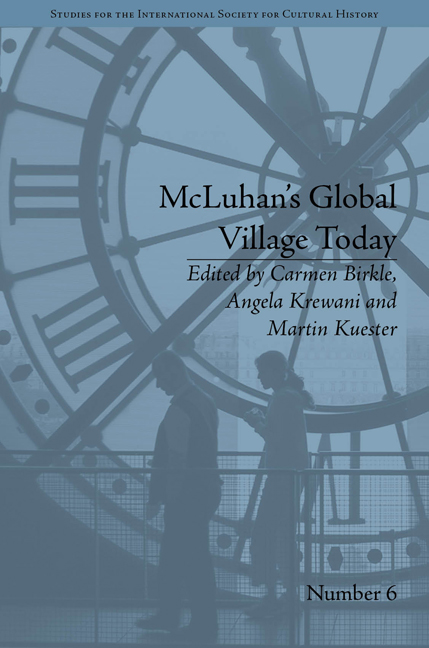Book contents
- Frontmatter
- CONTENTS
- List of Contributors
- List of Figures
- McLuhan's Global Village Today: An Introduction
- Part I McLuhan and Media Theory
- Part II McLuhan and Literature
- 7 Herbert Marshall McLuhan: Before The Mechanical Bride
- 8 ‘Cambridge was a Shock’: Comparing Media from a Literary Critic's Point of View
- 9 Master, Collaborator and Troll: Marshall McLuhan, Wilfred Watson and Brian Fawcett
- 10 Taking Action: What Comics Demand of their Recipients
- Part III McLuhan and Technical Media
- Notes
- Index
7 - Herbert Marshall McLuhan: Before The Mechanical Bride
from Part II - McLuhan and Literature
- Frontmatter
- CONTENTS
- List of Contributors
- List of Figures
- McLuhan's Global Village Today: An Introduction
- Part I McLuhan and Media Theory
- Part II McLuhan and Literature
- 7 Herbert Marshall McLuhan: Before The Mechanical Bride
- 8 ‘Cambridge was a Shock’: Comparing Media from a Literary Critic's Point of View
- 9 Master, Collaborator and Troll: Marshall McLuhan, Wilfred Watson and Brian Fawcett
- 10 Taking Action: What Comics Demand of their Recipients
- Part III McLuhan and Technical Media
- Notes
- Index
Summary
Marshall McLuhan was a pioneer in media studies, a communications theorist before the term was widely used, and the essays in this volume have been highlighting many aspects of his criticism of the media. But McLuhan was much more than a communications theorist. He was, from the beginning of his career, a teacher of literature and a literary scholar, roles he played from his earliest years until the time of his death.
As an undergraduate at the University of Manitoba, McLuhan planned to become an engineer – but he transferred to English, receiving his BA (1933) in English and Philosophy and his MA (1934) in English with a thesis on the nineteenth-century fiction and poetry writer George Meredith. He then attended Cambridge University where he obtained his second BA (1936) and his MA (1940) and ultimately his PhD (l943) with a dissertation on the English Renaissance fiction writer and essayist Thomas Nashe. Looking back on this early period of his career, McLuhan commented:
For many years, until I wrote my first book, The Mechanical Bride, I adopted an extremely moralistic approach to all environmental technology. I loathed machinery, I abominated cities, I equated the Industrial Revolution with original sin and mass media with the Fall. In short, I rejected almost every element of modern life in favour of a Rousseauvian utopianism.
- Type
- Chapter
- Information
- McLuhan's Global Village TodayTransatlantic Perspectives, pp. 75 - 84Publisher: Pickering & ChattoFirst published in: 2014



